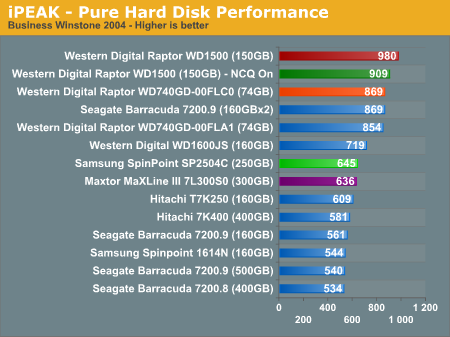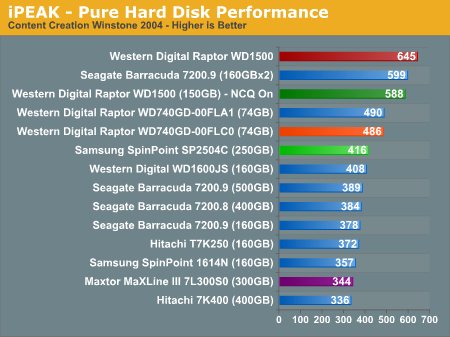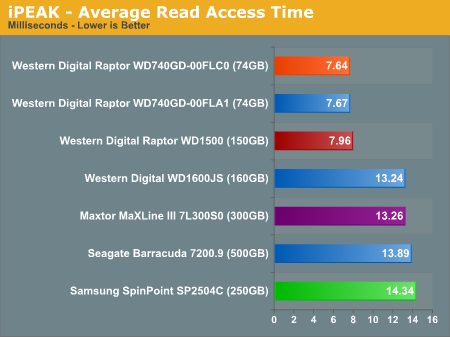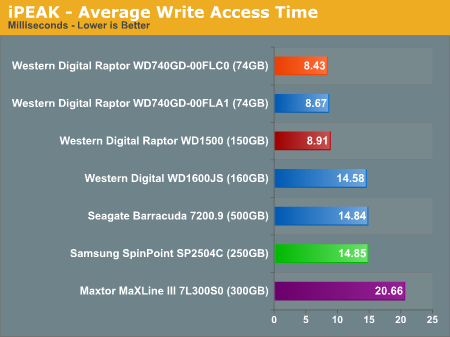Western Digital WD1500ADFD: King Raptor
by Gary Key on February 8, 2006 1:30 AM EST- Posted in
- Storage
Hard Disk Performance: iPEAK
We played back Anand's raw files that recorded I/O operations when running a real world benchmark - the entire Winstone 2004 suite. Intel's iPEAK utility was then used to play back the trace file of all I/O operations that took place during a single run of Business Winstone 2004 and MCC Winstone 2004. The drive was formatted before each test run and a composite average of 3 tests on each drive was tabulated in order to ensure consistency in the benchmark.
iPeak gives a mean service time in milliseconds; in other words, the average time that each drive took to fulfill each I/O operation. In order to make the data more understandable, we report the scores as an average number of I/O operations per second so that higher scores translate into better performance.
The performance of the Raptor WD1500 is extremely impressive and represents a 13% increase over the Raptor 740GD in the Business Winstone test and an incredible 33% increase in the Content Creation Winstone test. Turning NCQ on results in a hit of 8% in the Business Winstone test and 9% in the Content Creation Winstone test. Although the drive maintains excellent performance with NCQ activated we highly recommend turning it off when used in a single-user environment. While the WD1500 random access times are slightly higher than the Raptor 740GD, the overall performance of this drive is consistently better. The Samsung SP2504C provides excellent results considering the bargain pricing on the drive and leads the Maxtor 7L300S0 in most of the test results.




We played back Anand's raw files that recorded I/O operations when running a real world benchmark - the entire Winstone 2004 suite. Intel's iPEAK utility was then used to play back the trace file of all I/O operations that took place during a single run of Business Winstone 2004 and MCC Winstone 2004. The drive was formatted before each test run and a composite average of 3 tests on each drive was tabulated in order to ensure consistency in the benchmark.
iPeak gives a mean service time in milliseconds; in other words, the average time that each drive took to fulfill each I/O operation. In order to make the data more understandable, we report the scores as an average number of I/O operations per second so that higher scores translate into better performance.
The performance of the Raptor WD1500 is extremely impressive and represents a 13% increase over the Raptor 740GD in the Business Winstone test and an incredible 33% increase in the Content Creation Winstone test. Turning NCQ on results in a hit of 8% in the Business Winstone test and 9% in the Content Creation Winstone test. Although the drive maintains excellent performance with NCQ activated we highly recommend turning it off when used in a single-user environment. While the WD1500 random access times are slightly higher than the Raptor 740GD, the overall performance of this drive is consistently better. The Samsung SP2504C provides excellent results considering the bargain pricing on the drive and leads the Maxtor 7L300S0 in most of the test results.










51 Comments
View All Comments
Gary Key - Wednesday, February 8, 2006 - link
Yes, the WD740GD-00FLC0 is the drive listed under the WD740GD description. I will have an additional notation up shortly.